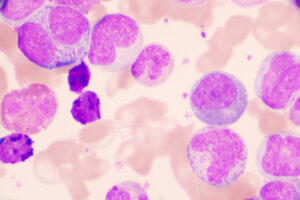Oncology
Chronic Lymphocytic Leukemia
Engineered Cellular Immunotherapy for Chronic Lymphocytic Leukemia
Overview
Chimeric antigen receptor (CAR) T-cell therapy is a promising technology, but studies have not led to a US Food and Drug Administration–approved product for chronic lymphocytic leukemia (CLL). Richter’s transformation (RT) is a rare but devastating complication of CLL for which CAR T-cell therapy has shown substantial promise.
Expert Commentary
John C. Byrd, MD
|
|
“ . . . RT of CLL is where I see CAR T cells potentially making a big impact, and this is a space in which nothing else that has been tried in the past has really worked.”
While CAR T-cell therapy is an approved option for mantle cell lymphoma and large B-cell lymphoma, data showing the benefits of this approach in CLL have been more limited. There are some reports of patients with CLL surviving more than 10 years after receiving an infusion of CD19-specific CAR T cells; however, most studies have found that fewer than 50% of patients with CLL achieve complete remissions. Most recently, the primary analysis of the single-arm phase 1/2 TRANSCEND CLL 004 study reported a complete response rate of only 18% with the administration of the CD19-targeted CAR T-cell product lisocabtagene maraleucel. This was in a population that was characterized by treatment failure with a previous Bruton tyrosine kinase (BTK) inhibitor, with a large subset also having experienced venetoclax failure.
I think that part of the problem relates to the compromised T-cell function and the unfavorable microenvironment in patients with CLL from whom T cells are collected for CAR T-cell manufacturing. Our group, together with the group led by Carl H. June, MD, at the University of Pennsylvania, have produced data suggesting that BTK inhibition may help with T-cell function in that regard.
So, as the field moves forward, having an effective cellular therapy will certainly be important, but we also need to address the immunosuppressive microenvironment in CLL. This is something to watch for on the horizon, along with the development of other promising engineered cell therapies for CLL, such as CAR-engineered natural killer cell therapies and bispecific T-cell therapy. For now, until we can show that CAR T-cell therapies are inducing real, durable remissions that are potentially curative or that are enabling patients to have incredibly extended treatment-free periods, the potential advantages, in my view, are marginal when we have other options with less toxicity.
In contrast, RT of CLL is where I see CAR T cells potentially making a big impact, and this is a space in which nothing else that has been tried in the past has really worked. RT is not a common complication of CLL, but it is devastating when it happens. When we see a diagnosis of RT, our current approach is to treat as effectively and expeditiously as possible on the way to a CAR T-cell trial or protocol, and many groups are now also taking this approach. The data are still limited in terms of the overall numbers of patients, but it does not take too many patients to know when something is making a big difference for an extended period of time.
References
Allen ES, Stroncek DF, Ren J, et al. Autologous lymphapheresis for the production of chimeric antigen receptor T cells. Transfusion. 2017;57(5):1133-1141. doi:10.1111/trf.14003
Fraietta JA, Beckwith KA, Patel PR, et al. Ibrutinib enhances chimeric antigen receptor T-cell engraftment and efficacy in leukemia. Blood. 2016;127(9):1117-1127. doi:10.1182/blood-2015-11-679134
Frey NV, Gill S, Hexner EO, et al. Long-term outcomes from a randomized dose optimization study of chimeric antigen receptor modified T cells in relapsed chronic lymphocytic leukemia. J Clin Oncol. 2020;38(25):2862-2871. doi:10.1200/JCO.19.03237
Gill S, Vides V, Frey NV, et al. Anti-CD19 CAR T cells in combination with ibrutinib for the treatment of chronic lymphocytic leukemia. Blood Adv. 2022;6(21):5774-5785. doi:10.1182/bloodadvances.2022007317
Heyman BM, Tzachanis D, Kipps TJ. Recent advances in CAR T-cell therapy for patients with chronic lymphocytic leukemia. Cancers (Basel). 2022;14(7):1715. doi:10.3390/cancers14071715
Liu E, Marin D, Banerjee P, et al. Use of CAR-transduced natural killer cells in CD19-positive lymphoid tumors. N Engl J Med. 2020;382(6):545-553. doi:10.1056/NEJMoa1910607
Long M, Beckwith K, Do P, et al. Ibrutinib treatment improves T cell number and function in CLL patients. J Clin Invest. 2017;127(8):3052-3064. doi:10.1172/JCI89756
Melenhorst JJ, Chen GM, Wang M, et al. Decade-long leukaemia remissions with persistence of CD4+ CAR T cells [published correction appears in Nature. 2022;612(7941):E22]. Nature. 2022;602(7897):503-509. doi:10.1038/s41586-021-04390-6
Porter DL, Hwang W-T, Frey NV, et al. Chimeric antigen receptor T cells persist and induce sustained remissions in relapsed refractory chronic lymphocytic leukemia. Sci Transl Med. 2015;7(303):303ra139. doi:10.1126/scitranslmed.aac5415
Robinson HR, Qi J, Cook EM, et al. A CD19/CD3 bispecific antibody for effective immunotherapy of chronic lymphocytic leukemia in the ibrutinib era. Blood. 2018;132(5):521-532. doi:10.1182/blood-2018-02-830992
Siddiqi T, Maloney DG, Kenderian SS, et al. Lisocabtagene maraleucel in chronic lymphocytic leukaemia and small lymphocytic lymphoma (TRANSCEND CLL 004): a multicentre, open-label, single-arm, phase 1-2 study. Lancet. 2023;402(10402):641-654. doi:10.1016/S0140-6736(23)01052-8
Turtle CJ, Hay KA, Hanafi L-A, et al. Durable molecular remissions in chronic lymphocytic leukemia treated with CD19-specific chimeric antigen receptor-modified T cells after failure of ibrutinib. J Clin Oncol. 2017;35(26):3010-3020. doi:10.1200/JCO.2017.72.8519











